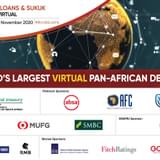Dave Uduanu, Managing Director of Nigeria’s Sigma Pensions Limited gets the sense that these elements are becoming more acute constraints on investment than in previous years, and the solution could prompt some difficult but beneficial change among the country’s corporates.
Q. Corruption, corporate governance and transparency have always weighed on the minds of emerging market and frontier investors. Are they becoming more acute in Nigeria? And if so, what do you think is driving that?
A. The short answer is: yes. This is something that very much constrains our investment strategy. And it is becoming a bigger challenge, in part because of how the country’s banking sector is evolving.
Banks in Nigeria have become capital constrained because non-performing loans have skyrocketed in recent years as the economy plunged into recession, hitting close to 17% in some cases; as a result, the Central Bank of Nigeria prevented certain banks from lending to certain names, which were largely clustered in the energy sectors – companies that were severely affected by the oil price crash. In some cases, certain companies broke their loan covenants, using the proceeds for certain uses that were not originally intended, which has among other things made banks reticent to lend to them.
Many lenders have since tightened up their lending requirements, and have increasingly relied on collateralised lending – leaving many borrowers searching for other sources of liquidity. That’s where we come in. Many borrowers have sought to bridge that gap by tapping pension funds and other capital market investors in a bid to borrow on the strength of their balance sheets and credit rating. We only invest in companies that are strong on governance, are transparent in their operations, and have a robust balance sheet of sufficient scale with strong underlying cashflows.
 Q. What portion of your portfolio goes towards local corporate bonds?
Q. What portion of your portfolio goes towards local corporate bonds?
A. We are mandated to invest up to 30% of our funds into local corporate bonds – and all of our investments must be made within the local market. Currently, about 5% of our portfolio is corporate bonds. This is in part because supply is dominated by the sovereign and sub-sovereign entities, and increasingly financial institutions. Many corporate entities are not yet at a scale – in terms of cashflows or borrowing needs – where it becomes materially significant for us to invest. Most corporates struggle to move beyond USD100mn transaction mark, and many only have needs for between USD25mn-70mn. There isn’t enough of a ticket to make it worthwhile for us as investors.
Q. How often is it the case that governance or transparency issues have been the deal breaker when it comes to investing?
A. Rarely, but it has happened – I can recall at least two occasions in recent years when we were presented with investment opportunities but on closer inspection of their governance practices, it was deemed too risky to invest. Given the size of the corporate bond market in Nigeria, that isn’t an insignificant amount. But the barriers to investing are more often simply a case of cashflows, the size of the transaction, or the relative health of the business.
Q. How robust is your due diligence on the governance and transparency side? What do you tend to look out for?
A. You start from the top. Who are the owners of the company? Usually we are more comfortable when we have professional investors, institutional investors, as shareholders, than if they are family businesses. We look at the composition of their Boards: Is there a separation of management and the Board? Are there independent directors? If the managing director and chairman are one and the same, that usually isn’t a good thing. We look at the quality of the auditing: We tend to be more comfortable with the Big Four, and I know they’ve had their issues but generally they tend to be quite good. Then we look at management quality: We often run sessions with management of these entities, to get a better idea of their strategy, their intentions with the business. We analyse the financial statements to understand quality of cashflows. And we rely on ratings.
We also look at what the money is going to be used for. In this market we often find that the funding corporates seek from us is used to pay back bank debt rather than for new capex. Our preference tends to be skewed towards new capex.
Q. What advice would you give to smaller corporates looking to enter the bond market and tap into local institutional funding?
A. The business and the governance structure are ultimately the two things you need to control, but you really need to get the governance structure right or investors will be hesitant to look further under the hood.
At the end of the day you need to ensure the business focus is there too, so that you see continuous improvement of the quality of the cashflows. In the current environment, companies are struggling, so this is easier said than done. Many of these companies are struggling to secure cost competitive and consistent supply of power or water, for instance; many of the companies we engage simply haven’t reckoned with many of these issues yet.
Q. Is there anything investors can do to help steer corporates towards the capital markets in a meaningful and sustainable way – that is, in such a way as to make them compelling investments?
A. Investors can play an important role by seeing out standards that help make these companies operate in a more professional way. I think we are getting to a point where we need to find a way to migrate corporates that are just below Investment Grade to IG. One of the ways that you can do that is construct a credit fund, that can go into a market and lend to these corporates in much the same way that private equity funds do, but without the equity upside. They can do deals as small as USD5-10mn and can help get these corporates growing faster. These funds can help do the important work of bringing these companies to scale, while at the same time helping them become more professional, transparent and governance-minded, and ultimately get them to the point where other investors will start to look at them as less risky investments.









